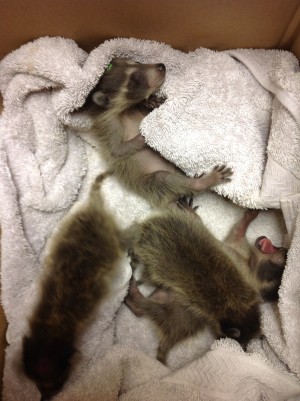
Baby Raccoon Care: A Comprehensive Guide
Introduction
Baby raccoons, also known as kits, are adorable and curious creatures that require specialized care to thrive. Whether you’ve stumbled upon an orphaned kit or are considering adopting one, understanding their unique needs is crucial for their well-being. This comprehensive guide will provide you with all the essential information you need to care for a baby raccoon, from feeding and housing to socialization and veterinary care.
Feeding
Formula:
- Newborn kits require a special formula specifically designed for baby raccoons.
- Feed every 2-3 hours, around the clock.
- Use a syringe or bottle with a small nipple.
- Gradually increase the amount of formula as the kit grows.
Solid Foods:
- Introduce solid foods gradually around 4-6 weeks of age.
- Start with soft, easily digestible foods such as baby food, scrambled eggs, and cooked chicken.
- Gradually add more variety and textures to their diet.
Water:
- Provide fresh water at all times.
- Kits may prefer to drink from a shallow dish or a water bottle with a sipper tube.
Housing
Nest Box:
- Create a cozy nest box for the kit using a small cardboard box or a pet carrier.
- Line the box with soft materials such as towels or blankets.
- Place a heating pad on low under half of the box to provide warmth.
Cage:
- As the kit grows, it will need a larger cage.
- Choose a cage that is at least 3 feet by 3 feet by 3 feet.
- Provide plenty of climbing and hiding places.
Temperature:
- Newborn kits require a temperature of around 95°F (35°C).
- Gradually decrease the temperature as they grow.
- Use a thermometer to monitor the temperature inside the nest box or cage.
Socialization
Handling:
- Handle the kit gently and frequently to socialize it.
- Talk to it in a soothing voice and avoid making sudden movements.
- Supervise children when interacting with the kit.
Playtime:
- Provide the kit with plenty of toys to play with.
- Engage in interactive play sessions to stimulate its mental and physical development.
- Allow the kit to explore its surroundings under supervision.
Companionship:
- If possible, provide the kit with a companion of the same species.
- Companionship helps reduce stress and promotes healthy development.
Veterinary Care
Regular Checkups:
- Take the kit to a veterinarian for regular checkups to monitor its health and growth.
- Vaccinations and deworming are essential for preventing diseases.
Common Health Issues:
- Raccoon distemper: A highly contagious viral disease that can be fatal.
- Parvovirus: A viral infection that causes vomiting, diarrhea, and lethargy.
- Respiratory infections: Caused by bacteria or viruses, these infections can lead to coughing, sneezing, and difficulty breathing.
Emergency Situations:
- If the kit is not eating, drinking, or eliminating, seek veterinary attention immediately.
- If the kit has any unusual symptoms, such as seizures, vomiting, or diarrhea, contact a veterinarian as soon as possible.
Rehabilitation and Release
Rehabilitation:
- If the kit is orphaned or injured, it may require rehabilitation before it can be released back into the wild.
- Contact a licensed wildlife rehabilitator for assistance.
Release:
- Once the kit is healthy and has reached a suitable age, it can be released back into its natural habitat.
- Choose a release site that is safe and has an abundance of food and shelter.
Legal Considerations
- Check local laws and regulations regarding the ownership and care of raccoons.
- Some areas may require permits or licenses.
- It is illegal to release non-native raccoons into the wild.
Conclusion
Caring for a baby raccoon is a rewarding but challenging experience. By following the guidelines outlined in this guide, you can provide your kit with the optimal care it needs to thrive. Remember to prioritize the kit’s health, socialization, and well-being throughout its development. With patience, dedication, and a love for these curious creatures, you can help them reach their full potential and live a long and fulfilling life.
